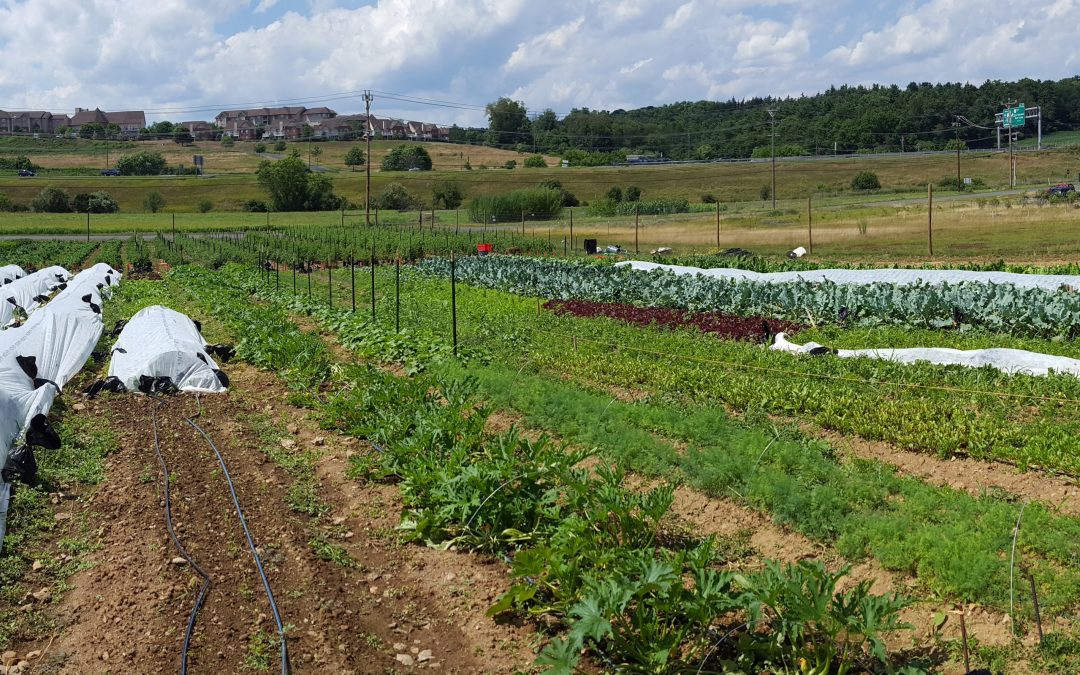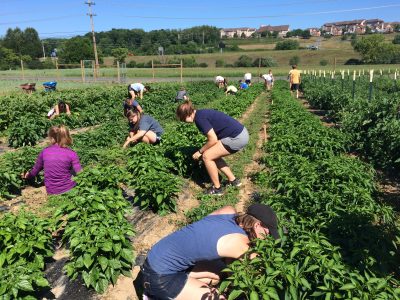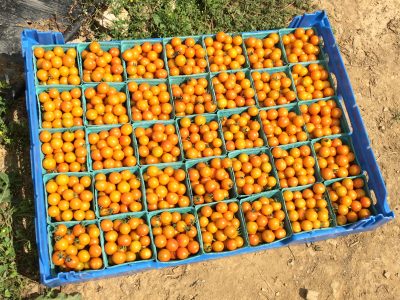By: Olivia Hort
Three years ago, a living, learning laboratory that fostered a sense of community through growing sustainable food was merely a dream shared by a number of faculty, staff and students. As Penn State’s student-centered sustainable farm celebrates its first year, the leaders of the program want to recognize the people who contributed to the organization’s success. The Student Farm crew is grateful to members of the broader Penn State community who have worked tirelessly to support the mission of the organization.
“It has truly been a Penn State-wide effort. We want to thank the many people who have gone above and beyond to help get us up and running,” said Leslie Pillen, program manager and advisor to Student Farm Club.
The Sustainability Institute, under director Denice Wardrop, made the early and essential investment in what was originally just the seed of an idea. A grant from the Sustainability Institute in 2013 spurred the planning process for the farm. It funded the establishment of the Sustainable Food Systems Program, which houses the Student Farm Club and pending Food Systems minor. Both offer engagement opportunities for students to learn about food systems issues, sustainability and agriculture.
Another key facilitator of this young initiative was Penn State’s College of Agriculture and its Dean, Richard Roush. They have provided a great deal of support for the program and have worked hard this past year to help the dream of the Student Farm become a reality.
In the beginning phases of the project’s development, community stakeholders envisioned the farm becoming a gathering place where students and community members meet to learn, collaborate and utilize their skills to solve real-world challenges. Today, the mission of the student-centered sustainable farm and SFSP is to grow local food access, enhance food systems education and cultivate a sense community.
Significant support for this mission came in November of 2015, when Penn State’s student government (UPUA) unanimously passed legislation supporting the establishment of the Student Farm. Without this level of support and commitment from the campus community, the Student Farm would not be the growing and thriving program it is today.
“It shows that the students of Penn State believe in our mission and want to support the achievement of our goals. We are so appreciative for that,” said Pillen.
As support for the initiative continued to grow, the University granted one acre of land to the Student Farm in January, 2016 for a three-year pilot. After the location of the site was established at the intersection of Big Hollow Road and Fox Hollow Road, the Facilities Fee Advisory Committee allocated $223,434 to fund startup costs and other expenses in support of the farm for the three year pilot.
Along with the student representatives, Student Affairs Vice President, Damon Sims was a key supporter in this crucial juncture of the farm’s establishment. Sims offered needed advice and encouragement to the student leadership team throughout the process.
Once the Student Farm had an official home, club members began to develop plans for the site and their future harvests. The team soon realized there were site infrastructure needs that required help from others.
At an Office of Physical Plant (OPP)-organized meeting of supportive campus staff, individuals from several units volunteered time, resources, and expertise to get the farm up and running. “That was a memorable day because of how willing everyone was to help,” said Pillen, “The people who attended that meeting weren’t required to be there. They came because they wanted to help get us off to a great start on our new site.”
Beginning in March 2016, more individuals from across the University reached out to lend a helping hand to prepare the one-acre site for its first season. Steve Maruszewski, Assistant Vice President of OPP, Jeff Dice, Grounds and Maintenance Supervisor for OPP and volunteers from The College of Agricultural Sciences got “down in the dirt” to support the farm’s initial infrastructure needs.
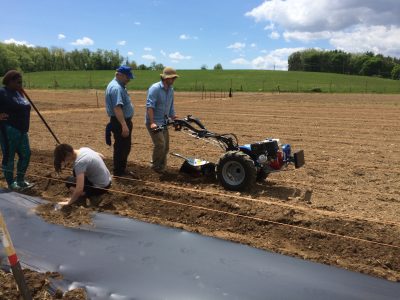
Summer 2016 Intern Michael Cahill learns how to use the tiller — which was a much needed relief after the intern team spent weeks building the first set of beds by hand
Farm Services, a branch of the College of Agriculture spread compost and the farm manager for Rock Springs Research Farm, Bob Oberheim, tilled the organic material into the ground. OPP assisted in the siting of storage sheds, which were designed and built by students in Architecture. A deer fence and water system were also installed by OPP. The College of Agriculture contributed greenhouse space for seedlings and the Plant Science department provided office space.
Once the site was prepared, student interns and club members were eager to begin planting seeds and maintaining the site in hopes of a successful first harvest. Students and interns were excited to take advantage of the opportunities on the farm to extend their education beyond the classroom.
Pillen emphasized how the internships and educational opportunities offered through the farm are what transform it into a learning, living laboratory. In 2016, 15 student interns from five academic colleges worked to support the farm’s mission while also developing career and leadership skills.
Farm intern Alex Curtze had the opportunity to learn about small-scale farming techniques and created a cricket farming project to benefit the site. Along the way, Curtze learned an important lesson. He said the challenges he faced in his project taught him that failures can be viewed as an opportunity to find a better way to resolve the problem.
Student Farm interns play an integral role in all aspects of maintaining the farm, from production to marketing, research, outreach and everything in between. Because internships support the ongoing work of the farm, Housing and Food Services has contributed $32,000 to provide five student interns with an educational opportunity to manage the farm and build educational outreach capacity within the dining commons in 2017.

Club leaders Hayly Hoch, Nick Michalisin, and Alyssa Gurklis smile in the greenhouses while inspecting plants for the 2015 Student Farm Club plant sale
Throughout the 2016 season, over 700 students engaged with the farm and took advantage of the unique learning environment through volunteering, course projects and opportunities to partake in the local food conversation. The high involvement on the farm created a fun, positive environment where students and community members connect with each other to learn. “The educational goals we strive to meet through involving people on the farm have been so rewarding for everyone involved,” said Pillen.
In 2016, Student Farm Club co-director Hayly Hoch partnered with a local nonprofit, The ACRES Project, as part of her Erickson Discovery Grant Program research. Adults with autism created and installed bird houses on the farm, which served to increase biodiversity on the site. The volunteers did everything from researching the ideal habitat for specific birds to the installation of the homes. The farm is grateful to The ACRES Project for also donating a drill to assist in upcoming projects. “It was so wonderful to build something beautiful that provided job training for this organization’s clients while also benefitting the farm,” said Hoch.
Faculty members have supported the farm through “course-client collaborations.” The program allows faculty and students to create projects that integrate the learning objectives of their course with hands-on experience that assists the farm in its mission.
The collaborations have allowed over 500 Penn State students to interact with the learning laboratory on the farm. Twenty-six courses across seven academic colleges have supported the farm through their projects. Looking into 2017, the organization wants to continue to grow and broaden engagement opportunities for students and people across the community.

Students from an agroecology course took a field trip out to the farm to inspect the farm’s pollinator garden
Other campus community members have contributed to the organization’s success through volunteering on the farm. The College of Agricultural Sciences generously donated transportation to the farm for volunteers in summer 2016. They also sponsored an open house on the farm, where prospective students learned about the organization and toured the site.
Community members attended a volunteer day in June, 2016, where a pollinator garden was planted to attract insects that would benefit the farm. The beautiful flowers planted gave the farm some extra color and helped support the health of the crops. The farm is thankful to the 150 hard-working volunteers who donated over 300 hours of their time to support the organization’s successful harvests.
When it was time to harvest the first crops of the season, the farm received overwhelming support from organizations and community members who wanted to harvest and purchase produce. Pillen said buying the farm’s produce is another important way that the Penn State community has supported the initiative.
In 2016, the farm grew over 34 different crops and sold 10,330 pounds of produce. The foods grown on the site ranged from kale to broccoli, cantaloupe and okra, just to name a few. The biggest crop of 2016 was tomatoes. The farm grew over 900 tomato plants and sold over 3,000 pounds. That’s a lot of pasta sauce!
HFS buys produce to serve in the on-campus dining halls and at restaurants such as The Nittany Lion Inn and The Penn Stater Hotel. They also supported the farm in 2016 when they hosted “Local Foods Night” in the dining halls, where students enjoyed a delicious meal and learned about sustainable food. Jim Richard, Director of Residential Dining has been a key supporter of the farm’s mission of providing sustainable food, along with the many other staff and chefs at HFS. The Village at Penn State also purchased Student Farm produce during the 2016 season.
Members of the community also supported the farm through its CSA, or Campus Supported Agriculture program. A subscription to the program provides a weekly assortment of produce from the farm for two nine-week periods. In the summer and fall of 2016, the CSA program served over 40 members.
The Student Farm Club was honored to be featured guests of Dean Richard Roush at The College of Agricultural Science’s donor recognition event in fall 2016. Produce from the farm was used to serve about 300 meals and pictures from the farm site were played on a slideshow for guests. Eighteen Student Farm Club volunteers organized to take donors and alumni through a virtual tour of the farm site.
Pillen said that even though poor weather conditions prevented the group from going to the farm, club members were still determined to show donors the student involvement opportunities offered by The College of Agricultural Sciences. The group improvised by giving a virtual tour of the farm at the Penn Stater Hotel. Guests heard from students about the diversity of experiences afforded to them through the Student Farm.
Pillen said in the farm’s first year she learned the importance of positive energy, hard work and commitment. She believes the Student Farm owes a great deal of gratitude and appreciation to all of those who have supported the organization and advocated for the mission of the SFSP and Student Farm.
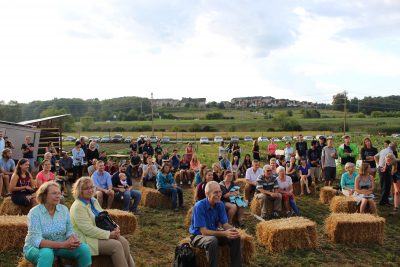
Community members gathered at the Farm’s First Inagural Fall Harvest Festival in September 2016. Photo: Ahmed Al-Mahrooqi
Referencing goals for the organization in the coming year, Pillen said they are focused on expanding their educational and engagement opportunities for students and community members. Interns are looking forward to a second growing season on the site and Pillen said they want to focus on refining production systems. This year, members of the organization are also hoping to revisit the conversation about a permanent home for the Student Farm.
Although Pillen acknowledges there are many “unknowns” in the future for the organization, she knows one thing with certainty.
“Without the continued efforts and support of our Student Farm family, we would not be where we are today. We appreciate everything this talented and passionate community has done to make the Student Farm a reality, and we look forward to even more collaboration in projects and opportunities to come.”

